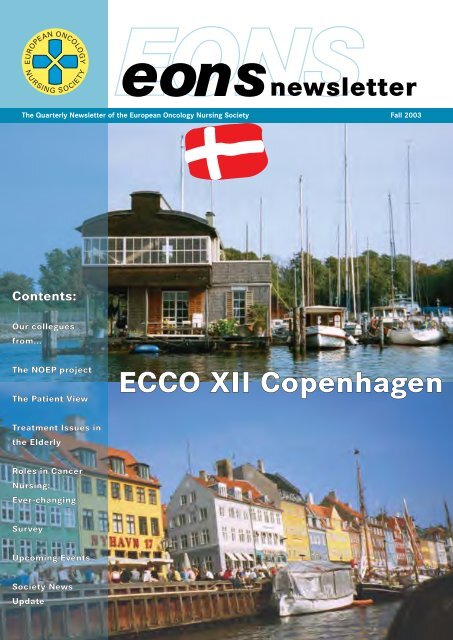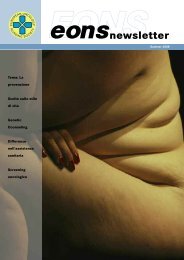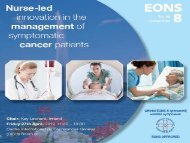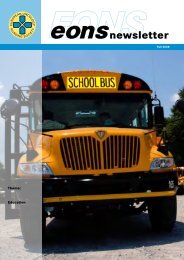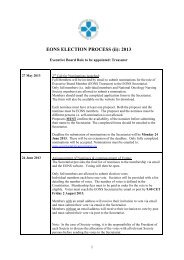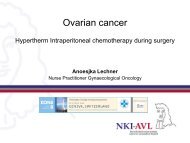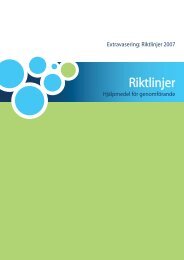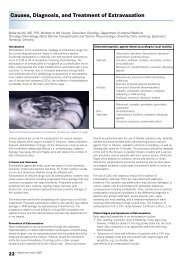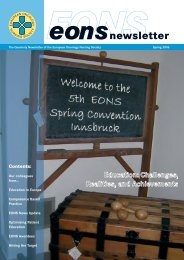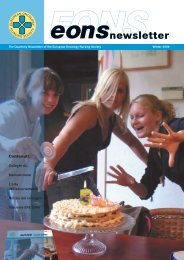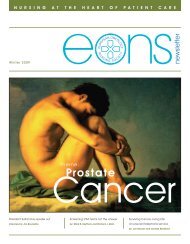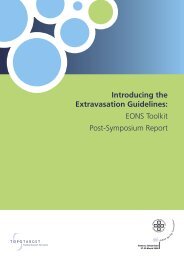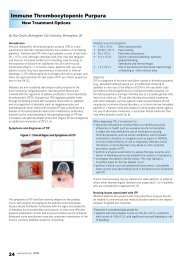ECCO XII Copenhagen - the European Oncology Nursing Society
ECCO XII Copenhagen - the European Oncology Nursing Society
ECCO XII Copenhagen - the European Oncology Nursing Society
You also want an ePaper? Increase the reach of your titles
YUMPU automatically turns print PDFs into web optimized ePapers that Google loves.
ColophonEditor in ChiefKarin Ahlberg, RN, MScEditorial Board:Jan Foubert, RN, MScCarol Krcmar, RN, MNEmile Maassen, RN, CRNThe goal of <strong>the</strong> EONS Newsletter isto inform nurses about EONS andEONS activities and to inspire nursesthroughout Europe to improve <strong>the</strong>care of <strong>the</strong> cancer patient.The purpose of this Newsletter is toprovide:- Information on EONS activities- Practical information of interestfor <strong>the</strong> EONS members- A networking forum for cancernurses throughout EuropePrint run: 4.000 copies,Electronic version accessible by18.000 EONS membersEONS secretariatRudi BrikéAvenue E Mournier 83/4B-1200 Brussels, BelgiumTel.: +32 (2) 779 9923Fax: +32 (2) 779 9937E-mail: eons@village.uunet.beWebsite:www.cancereurope.org/EONS.htmlAll correspondence should beaddressed to <strong>the</strong> Editor-in-Chief:eons@village.uunet.beCover: photographs of <strong>Copenhagen</strong>taken by Helene EkforsEONS likes to acknowledge Amgenas sustaining member of our societyPrinted in HollandDrukkerij Trioprint Nijmegen bvHolland- NEWSLETTER SPRING 20032Dear Colleagues,Welcome to <strong>the</strong> fall 2003 issue of <strong>the</strong> EONS Newsletter, <strong>the</strong> Newsletter of <strong>the</strong> <strong>European</strong> <strong>Oncology</strong> <strong>Nursing</strong><strong>Society</strong>! This special issue of <strong>the</strong> Newsletter will not only be sent to our regular readers but will be distributedat <strong>the</strong> <strong>ECCO</strong> 12 conference in <strong>Copenhagen</strong> as well. Participants at <strong>ECCO</strong>, and new readers, will findlots of information about EONS in this issue. For example, <strong>the</strong> article, Nutrition in <strong>Oncology</strong> - EducationalProgram (NOEP) describes a program developed to raise awareness of <strong>the</strong> importance of nutrition in cancercare. The program, funded by Nutricia, will be officially launched at a satellite symposium at <strong>ECCO</strong> 12 onWednesday September 24, 17:30 to 19:00. The symposium is designed as an interactive session to discussnutrition in oncology, present and discuss results of <strong>the</strong> needs analysis performed during <strong>the</strong> 3rd SpringConvention, and to discuss <strong>the</strong> positive outcomes of a program test implementation conducted in <strong>the</strong> CzechRepublic in June 2003. This cutting edge symposium shouldn’t be missed! There’s also exciting news about<strong>the</strong> <strong>European</strong> Journal of <strong>Oncology</strong> <strong>Nursing</strong>, <strong>the</strong> official journal of EONS. It has been accepted by <strong>the</strong>National Library of Medicine for inclusion in <strong>the</strong> Medline and PubMed abstracting and indexing services.Also in this issue is a paper on <strong>the</strong> changing role of <strong>the</strong> cancer nurse. Cancer nursing has always been aunique speciality within <strong>the</strong> profession of nursing. Now internal and external influences have brought aboutnumerous changes in how and where we practice; nurses are now care managers practicing in independentroles. Their pivotal role in <strong>the</strong> multi-professional team is gaining recognition. The author states that nurses incancer care have accomplished a great deal, in part because we have taken <strong>the</strong> initiative to control andinfluence issues which affect our practice. Our challenge, she argues, is to continue to develop our role toachieve personal and professional satisfaction and to better meet <strong>the</strong> needs of our patients. I urge you toread <strong>the</strong> article, reflect on its contents, and use it as a basis for discussions with colleagues. One of <strong>the</strong>tasks of <strong>the</strong> EONS Editorial team is to co-ordinate communications with EONS members. To know how thismay be done best, we need to hear your opinions! In this issue you can find a questionnaire with <strong>the</strong> aims tofind out your satisfaction and opinions about <strong>the</strong> EONS Newsletter and Website. Please take <strong>the</strong> time to fill<strong>the</strong> questionnaire in. If you are attending <strong>ECCO</strong> 12, be sure to make <strong>the</strong> experience memorable! The nursingprogram includes topics of interest for everyone; clinical nurses, researchers, educators and managers. Talkwith colleagues, listen to interesting presentations and take time to visit <strong>the</strong> poster presentations. Be sure tostop by <strong>the</strong> EONS stand to learn more about <strong>the</strong> <strong>Society</strong> and chat with members of <strong>the</strong> Executive Board: aBoard member is always on duty to answer questions and has an ear open for your ideas and suggestions.My most important advice for <strong>ECCO</strong> participants; don’t forget to enjoy yourself!Karin Ahlberg, Editor-in-ChiefThe Right Balance between Commitment and Responsibilitywithin <strong>the</strong> Boundaries of PossibilitiesDuring my term as President of EONS, I was oftenconfronted with finding <strong>the</strong> right balance betweencommitment and responsibility within <strong>the</strong> boundariesof possibilities. The position of <strong>the</strong> President requiresa complete commitment to <strong>the</strong> society and its goals.It also means that you have to take <strong>the</strong> responsibilityto lead <strong>the</strong> <strong>Society</strong> in all aspects. To take <strong>the</strong> lead in<strong>the</strong> <strong>Society</strong> means that you need to be available for<strong>the</strong> members, societies, and a tremendous numberof organisations with whom <strong>the</strong> <strong>Society</strong> interacts.Despite <strong>the</strong>se challenges, it was a great honour toserve as President and <strong>the</strong> experience has enrichedmy personal life and professional career. During mypresidency, I was in <strong>the</strong> position to influence <strong>the</strong>position of oncology nurses in very different ways.EONS now plays a more important role as a fullmember society of <strong>the</strong> Federation of <strong>European</strong>Cancer Societies and EONS is very often asked byo<strong>the</strong>r member societies to become involved inworking groups and <strong>European</strong> Projects. I have alsonoted with pleasure that <strong>the</strong> oncology nurse hasbecome a serious partner in <strong>the</strong> multi-professionalhealthcare team at <strong>the</strong> national level. When I lookback on my goals as President and <strong>the</strong> goals set outby <strong>the</strong> Board of Directors in 2001, I realize that weare in <strong>the</strong> middle of an important discussion relatedto influencing and directing <strong>the</strong> future of oncologynursing practice in Europe. This discussion was <strong>the</strong>main item of <strong>the</strong> Advisory Council Meeting inBrussels in March 2003. The outcome of this twodaymeeting illustrated that EONS needs to changeits current policy and strategy for <strong>the</strong> future.The proposals for <strong>the</strong> new goals will be discussedwith members during <strong>the</strong> General Meeting during<strong>ECCO</strong>12. Changing a policy and strategy takes timeand must be done very carefully. The proposedchanges will mean a greater involvement of nationalsocieties and individual members in activities andprojects. Personally I think that <strong>the</strong> involvement andcommitment is <strong>the</strong> base of changing <strong>the</strong> future.I believe in <strong>the</strong> new direction and goals and I willactively support <strong>the</strong>m in <strong>the</strong> future. An impressiveexperience for me was meeting <strong>the</strong> representativesof <strong>the</strong> diverse national societies when I was visiting<strong>the</strong>ir national conferences and meetings. I enjoyedand prospered from being involved in <strong>the</strong>ir discussionsabout professionalisation and <strong>the</strong> position ofoncology nurses in different countries. I reallybelieve that we can learn from each o<strong>the</strong>r in <strong>the</strong>future when we listen to <strong>the</strong> real messages anddemands from our members. Sometimes it feels likefailing when you are not in <strong>the</strong> position to give all <strong>the</strong>support <strong>the</strong>y need. It was at <strong>the</strong>se times that I felt<strong>the</strong> boundaries of possibilities: all problems cannotbe solved because <strong>the</strong>re is still a lack of humanresources, financial support and time to improve <strong>the</strong>situation.After two years as EONS President,I still cite my personal message: Creating your futurecan only done by yourself.Thank you for your confidence and friendshipduring my Presidency.Giel Vaessen
Carol R. Krcmar, RN, MNPolitical, economical, social and professional factors continuouslyinfluence changes in <strong>the</strong> role of <strong>the</strong> nurse in cancer care. Although notalways easy to accomplish, nor to accept, changes in practice areinevitable. If viewed positively, change presents an opportunity forpersonal and professional growth. Following is a discussion of some of<strong>the</strong> issues which are influencing change in <strong>the</strong> role of <strong>the</strong> cancer nurse.Changes in what we practice: direct careThe role and responsibilities of <strong>the</strong> nurse in direct patient care inhospitals is well-established. I once read: “a hospital withoutphysicians is a nursing home, a hospital without nurses is a hotel”.So significant is <strong>the</strong> presence of nurses in direct care, that <strong>the</strong> futureof cancer nursing is contingent on promoting, supporting,acknowledging and advancing <strong>the</strong> nurse’s role in this aspect ofpatient care. This includes fostering skill and knowledge acquisitionto develop <strong>the</strong> novice nurse into an expert. Strategies whichencourage development include strong mentoring in <strong>the</strong> clinical area,establishing clinical advancement programmes which legitimiselevels of practice, offering continuing education programmes andfostering collaboration with o<strong>the</strong>r disciplines in order to encourage<strong>the</strong> recognition of nursing expertise (Whitley, 1992).In this light, more attention needs to be given to <strong>the</strong> retention ofexperts at <strong>the</strong> bedside involved in direct care. To retain experts,Whitley (1992) recommends providing a flexible practice environmentin which <strong>the</strong> expert can make exceptions to rules in order toindividualise care; providing incentives, such as career advancement;administrative and managerial support for <strong>the</strong> role of <strong>the</strong> expert; andoffering private and group psychological support.Roles in Cancer <strong>Nursing</strong>: Ever-changing“a hospital without physicians is a nursing home, a hospital without nurses is a hotel”Changes in how we practice: advanced practiceA change already occurring in cancer nursing is <strong>the</strong> extension andexpansion of conventional roles as a result of changes in practice,scientific advances and <strong>the</strong> increasingly complex technical care ofpatients. Nurses are not only expanding <strong>the</strong>ir practice settings, <strong>the</strong>yare also expanding <strong>the</strong> services <strong>the</strong>y offer often entering intodomains traditionally occupied by o<strong>the</strong>r health care professionals.Debate concerning <strong>the</strong> definition of and educational criteria foradvanced practice is on-going in Europe. The joint EONS /EUROQUAN project on advanced practice identified <strong>the</strong> need forspecially prepared advanced nurses and <strong>the</strong> need for <strong>the</strong>development of an advanced cancer nursing education programmeacross Europe.Nurse involvement in genetic counselling bears mentioning as anexample of <strong>the</strong> expanded role of <strong>the</strong> nurse. The number of nursesinvolved in genetic counselling is steadily increasing world-wide.Nurse genetic counsellors are required to possess knowledge ofcancer genetics including implications for clinical practice and bewell versed on models of patient decision making, ethics, and issuessurrounding confidentiality (Hilton 1999).Changes in where we practice: ambulatory and home careDriven by <strong>the</strong> high-cost of health care, complicated treatments andprocedures are being performed with increasing frequency in <strong>the</strong>ambulatory and home settings. A survey conducted in <strong>the</strong> UnitedStates (Buerhaus & Staiger 1997) indicated that highly skilled nurses,especially in <strong>the</strong> area of palliative care, pain management andpatient education are in high demand in home health care. If this isalso true for Europe, experienced and specially trained cancer nursesshould have no trouble changing <strong>the</strong>ir place of employment fromhospital to <strong>the</strong> home care setting. In addition to strong clinical skills,job opportunities in home and ambulatory care involve re-examiningone’s personal strengths and weaknesses; <strong>the</strong>se positions oftenrequire flexible working hours, <strong>the</strong> ability to work independently,strong decision-making skills and assertiveness. Employmentopportunities are by no means confined to in-patient, out-patient andhome care. Ra<strong>the</strong>r, <strong>the</strong> options are extensive; limited only by <strong>the</strong>creativity and entrepreneurial spirit of <strong>the</strong> individual nurse.Changes in who we are: personal developmentFur<strong>the</strong>r development and refinement of two key personal skills,communication and leadership, is crucial if professional nurses areto meet <strong>the</strong> increasing demands expected of <strong>the</strong>m. Wilkinson (1999)identifies communication, toge<strong>the</strong>r with an ability to listen, as <strong>the</strong>most important aspect of practice. Effective communication providesa basis for <strong>the</strong> development of supportive relationships which helppatients cope with <strong>the</strong> effects of cancer (Northouse & Northouse1996). Excellent communication skills, both verbal and written,between members of <strong>the</strong> multi-professional team is essential intoday’s high tech and high paced care settings.Networking, a communication mode under utilised in nursing,provides nurses with <strong>the</strong> opportunity to discuss problems incurred ineveryday practice with colleagues. The personal and professionaladvantages of networking should not be underestimated.Stronger leadership skills are needed in nursing to handle <strong>the</strong>diversity and rate of changes occurring in health care. Hilton (1999)advocates that real change leaders capable of independent initiativesare needed at all levels of nursing to keep pace with changes inhealth care.External influences: technology and cultureNo o<strong>the</strong>r single item or event is having such a significant impact on<strong>the</strong> way we think and act as <strong>the</strong> information highway. InformationTechnology should be taught in basic and post-basic programmesand traditional methods of information dissemination (i.e. writtendocumentation) need to be supplemented with material in digitalform. Scrutiny of publications on <strong>the</strong> world wide web is necessary toaccess valid information and direct patients to reputable sources.
CANCER& MALNUTRITIONFOCUS ON FEEDINGNUTRICIA’S NUTRITIONAL THERAPYPART OF YOUR CANCER THERAPYMalnutrition is common in cancer patients and isassociated with reduced well-being and poorer clinicaloutcome. (1,2) It is, <strong>the</strong>refore, important to maintain oreven improve nutritional status before, during andafter cancer <strong>the</strong>rapy. (1,2) Nutritionalsupport has been shown to beeffective in achieving this. (2,3)NUTRICIA’s range of clinicalnutrition products andFLOCARE medical devices willhelp to improve nutritionalintake, and as part of yourcancer <strong>the</strong>rapy will be beneficialfor both you and your patients.(1)Nitenberg G, Raynard B. Crit Rev Oncol Hematol 2000;34:137-68.(2)Bozetti F. In: Payne-James et al (eds). 2 nd ed. London: GMM, 2001:639-80.(3)Den Broeder E et al. JPEN 2000;24:351-60.For more information, please contact:NUTRICIA - P.O. Box 1 - 2700 MA Zoetermeer -The Ne<strong>the</strong>rlandsTel: +31 (0) 79 353 96 00 - Fax: +31 (0) 79 353 96 50www.nutricia.com - e-mail: oncology@nutricia.com
EONS Newsletter and WebsiteSatisfaction SurveyThank you for helping us to serve you betterAs you may be aware, in 2002 <strong>the</strong> Executive Board set into existence an Editorial Team whose task it is to coordinate communication with EONSmembership through paper publications and <strong>the</strong> Internet. With this survey, we would like to solicit your satisfaction with <strong>the</strong> Newsletter and youropinions on <strong>the</strong> EONS website. We are also interested in your suggestions for future topics of interest and ideas to get more of <strong>the</strong> membershipinvolved in <strong>the</strong> two projects. Please take a few minutes to thoughtfully answer <strong>the</strong> following questions. We value your opinion and involvement.EONS Newsletter1. Have you read an issue of <strong>the</strong> EONS Newsletter? Yes No2. I read <strong>the</strong> EONS Newsletter on a regular basis. Yes No3. I regularly (4 times per year) receive <strong>the</strong> EONS Newsletter in paper form. Yes NoIf no, how many issues did you receive in 2002?4. I regularly (4 times per year) receive <strong>the</strong> EONS Newsletter in electronic (Pdf) form. Yes No5. I download issues of <strong>the</strong> Newsletter from my national societies home page. Yes No6. I download <strong>the</strong> Newsletter from <strong>the</strong> EONS web pages. Yes No7. How would you rate <strong>the</strong> overall quality of <strong>the</strong> Newsletter on a scale of 1-10,with 10 being <strong>the</strong> best possible quality/highest personal satisfaction with <strong>the</strong> Newsletter?highest 10 9 8 7 6 5 4 3 2 1 lowest8. Overall, I find <strong>the</strong> ‘look’ of <strong>the</strong> Newslettervery attractive 5 4 3 2 1 not attractive9. Please indicate which sections of <strong>the</strong> Newsletter you like/dislike. Like DislikeEditorialOur Colleagues from ...Feature articlesMeeting reportsEONS News10. The feature clinical article isalways helpful for my practice 5 4 3 2 1 never helpful for my practice11. Please rank order <strong>the</strong> following topics from 1 (high interest) to 5 (no interest).Treatment modalities:Chemo<strong>the</strong>rapy Radiation <strong>the</strong>rapy Surgical <strong>Oncology</strong> Biological <strong>the</strong>rapyGene <strong>the</strong>rapyDisease entities:Breast cancer Lung cancer Female GU cancer Male GU cancersLeukaemia Metastasis Gastric cancer Skin cancerColorectal cancer Head & Neck cancer Lymphoma and Hodgkin ’s diseaseSymptom management:Fatigue Nutritional support Body image Nausea and vomitingPain Grief and loss Psycho-social issues Care-giver supportCancer nursing:Documentation of care Role implementation Advanced practicePersonnel management <strong>Nursing</strong> shortage Professional issuesO<strong>the</strong>r issues:NEWSLETTER SPRING 2003 -7
12. Have you ever contributed an article to <strong>the</strong> Newsletter,or do you think you would consider doing so in <strong>the</strong> future? Yes NoI have contributed in <strong>the</strong> past Yes NoI may consider contributing in <strong>the</strong> future Yes No13. Any o<strong>the</strong>r comments that would help us improve <strong>the</strong> EONS Newsletter?EONS Website14. I visit <strong>the</strong> EONS website 1 x per week 1 x per month 1 x every 3 months1 x every 6 months 1 x per year never visited <strong>the</strong> site15. I have never visited <strong>the</strong> EONS website because: I was not aware of its existenceI do not have Internet accessI prefer to obtain EONS information from o<strong>the</strong>r sources16. I visit <strong>the</strong> website to obtain information on: Membership information News updates(check all that apply) Educational materials Upcoming eventsAccreditation services17. In my opinion, changes at <strong>the</strong> website should include: adding an interactive section(check all that apply)providing more linksproviding information in various languagesimproving site navigationmore input from membersmore information on:Yes, I would like to become more involved with <strong>the</strong> EONS Newsletter, EONS website, both.Name:Address:E-mail:Area of interest:Please hand in your completed questionnaire at <strong>the</strong> EONS Stand or send in <strong>the</strong> completed questionnaire to <strong>the</strong> EONS secretariat.See <strong>the</strong> adress in colophon. Thank you!Satisfaction Survey, MembershipSeptember 2003- NEWSLETTER SPRING 20038
NOEP: Ready to launch in September!The Nutrition in <strong>Oncology</strong> - Educational Program (NOEP) which wasdeveloped in co-operation with Nutricia, will be officially launched at<strong>the</strong> <strong>ECCO</strong> 12 in <strong>Copenhagen</strong>. A satellite symposium will be held onWednesday 24th September 2003 from 17:30 to 19:00 hours in room18/19. The symposium will provide an opportunity to discuss <strong>the</strong> lackof awareness that <strong>the</strong> role of nutrition has in oncology, to presentresults of <strong>the</strong> needs analysis performed during <strong>the</strong> last 3rd SpringConvention in Venice (which served as a basis to build NOEP) and todiscuss <strong>the</strong> positive outcomes of a program test implementation thatwas performed in Czech Republic in June 2003.Disease-related malnutrition (DRM)in CancerThe NOEP has been developed by <strong>the</strong> EONS, in partnership withNutricia, between April 2002 and June 2003. Following <strong>the</strong>development of <strong>the</strong> program, two test implementations were carriedout in Czech Republic and The Ne<strong>the</strong>rlands. Nurses in both countriesgave very enthusiastic and positive oral feedback and <strong>the</strong> programwas evaluated in very positive light (global evaluation of NOEP:9.44/10 in Czech Republic). Initial remarks from Czech nursesindicated that little attention is currently given to nutrition inoncology and that <strong>the</strong>y have a key role to play in that respect.NOEP was considered to be a multidisciplinary project and <strong>the</strong>reforean oncologist, a dietary nurse and a psychologist gave <strong>the</strong> workshoppresentations and shared <strong>the</strong>ir experiences. In terms of adapting <strong>the</strong>NOEP to meet individual country needs, <strong>the</strong> Czech Republicimplementation demonstrated that <strong>the</strong> translation needs a high levelof attention to ensure correct interpretation and is a key factor indetermining <strong>the</strong> success of <strong>the</strong> program. Speakers at <strong>the</strong> testimplementations took <strong>the</strong> opportunity to add extra slides or adaptcase studies that <strong>the</strong>y judged to be useful and essential for <strong>the</strong>comprehension of <strong>the</strong> program. The program was very demanding on<strong>the</strong> nurses in terms of hours of concentration, and it was concludedthat dividing <strong>the</strong> program into two days would provide a betteropportunity for nurses to exchange ideas and benefit from informationpresented in <strong>the</strong> case studies.In <strong>the</strong> coming weeks, final adaptations will be made to <strong>the</strong> programbased on <strong>the</strong> results of <strong>the</strong> test implementations, and keeping inmind that NOEP must provide a solid and structured content. Theseimprovements will also give <strong>the</strong> flexibility to add or adapt a fewslides. The folder including <strong>the</strong> complete NOEP will be available at<strong>ECCO</strong> 12 at <strong>the</strong> Nutricia stand (H-089).Spain and Belgium have already expressed <strong>the</strong>ir interest in launchingNOEP before <strong>the</strong> end of 2003. The next steps will be to implementNOEP across Europe. As NOEP is a partnership between <strong>the</strong> EONSand Nutricia, local implementation plans must be discussed between<strong>Oncology</strong> nursing societies and Nutricia at a country level. Pleasefeel free to contact your local Nutricia office to discuss <strong>the</strong>implementation of NOEP in your country. Preliminary meetings willbe arranged to discuss your expectations of NOEP and to construct adetailed action plan including deadlines for translations, organisationof workshops, numbers of workshops, participants to <strong>the</strong> workshopsetc. After submission of this action plan, Nutricia will fund <strong>the</strong> costsof <strong>the</strong> translation and <strong>the</strong> organisation costs agreed in advance.Evaluation of NOEP will be made in order to determine whe<strong>the</strong>r it ismeeting <strong>the</strong> expectations of nurses in terms of education, and tohelp improve <strong>the</strong> program through <strong>the</strong> development of new andinnovative ideas.The 4th Spring Convention of <strong>the</strong> EONS in April 2004 will provide anopportunity to discuss <strong>the</strong> NOEP implementation across Europe anddraw conclusions. If you wish to receive information regarding yourlocal Nutricia contact person, please contact Jan Foubert at:jan.foubert@skynet.be or François Convenant at:francois.convenant@nutricia.comThe <strong>European</strong> Journal of <strong>Oncology</strong> <strong>Nursing</strong> accepted forInclusion in <strong>the</strong> Medline and PubMed Abstracting andIndexing ServicesThe National Library of Medicine has accepted <strong>the</strong> <strong>European</strong> Journal of <strong>Oncology</strong> <strong>Nursing</strong> (EJON) for inclusion in<strong>the</strong> Medline and PubMed abstracting and indexing services. The Editor, Alexander Molasiotis, and <strong>the</strong> Publisher,Health Sciences ELSEVIER, put toge<strong>the</strong>r a detailed application to Medline earlier this year and have nowreceived notification that <strong>the</strong> application has been approved. Medline and PubMed are among <strong>the</strong> mostfrequently used abstracting and indexing services of <strong>the</strong> international medical community. The citation willprovide EJON authors with substantial additional international profile and coverage of <strong>the</strong>ir articles. All issues ofEJON from Volume 7 Number 1 onwards will be included.NEWSLETTER SPRING 2003 -9
InvitationDear members of <strong>the</strong> <strong>European</strong> <strong>Oncology</strong> <strong>Nursing</strong> <strong>Society</strong>, you are cordially invited to <strong>the</strong> General Meeting at <strong>the</strong> <strong>ECCO</strong> conference. The meetingis scheduled for Tuesday 22nd of September at 11:30 until 13:30 hours in auditorium 10/11 at <strong>the</strong> Bella center. During this meeting <strong>the</strong> proposalfor <strong>the</strong> new Strategy Plan of our <strong>Society</strong> will be presented and discussed. Individual members who are not able to attend this meeting are invitedto send in written comments to <strong>the</strong> EONS secretariat in Brussels before November 1st 2003.EONS Mission StatementPROPOSALThe Strategic CARE planThe mission of <strong>the</strong> <strong>European</strong> <strong>Oncology</strong> <strong>Nursing</strong> <strong>Society</strong> is toadd value to <strong>the</strong> work of its individual members and societiesin delivering care to patients with cancer. It aims to assist in<strong>the</strong> promotion of developing healthy communities throughinfluencing, research and education.Context of Strategic PlanEONS is a <strong>European</strong> citizen, it exists within many communities acrossEurope (both health and social) and not in isolation. It’s strength liesin co-operation and collaboration with a range of multi-professionalorganisations, helping to optimise <strong>the</strong> nursing contribution to cancercare. Underpinning this collaborative approach is <strong>the</strong> crucialrelationship EONS must continue to develop with National <strong>Oncology</strong><strong>Nursing</strong> Societies and individual nurses working with cancer patients.The <strong>Society</strong> recognises <strong>the</strong> diverse economic and multi-ethnicsociety across Europe and will strive to represent oncology nursing towork towards equitable training and development for nurses whowish to pursue a career in oncology. To this end, EONS supportsdiverse educational programmes through accreditation, andinstigates and supports clinical projects and research. This is inrecognition that cancer nurses will need a diversity of skills,competencies and related <strong>the</strong>ory to work in novel ways within anintegrated health and social care model.1. CommunicationEONS, as <strong>the</strong> recognised representative of <strong>European</strong> oncologynurses at <strong>the</strong> Federation of <strong>European</strong> Cancer Societies (FECS),fur<strong>the</strong>rs and facilitates communication between EONS and itsmembership, as well as <strong>the</strong> communication between <strong>the</strong> differentmember societies.2. Influencing <strong>the</strong> Political Agendaa. EONS will assist and support members to lobby forrecognised/agreed standards of oncology training/education,through recognition of oncology nursing as a speciality withineach membership countryb. EONS will provide current information to (inter)nationalprofessional representatives to raise <strong>the</strong> knowledge andawareness of <strong>the</strong> contribution of cancer nurses in Europe3. ResearchEONS will collaborate with member societies and keystakeholders to raise <strong>the</strong> profile of oncology nursing research inEurope. It will have a facilitative role helping o<strong>the</strong>rs to initiateresearch through guidance with funding issues, mentoring,publication and dissemination of results.4. EducationEONS will develop and implement, in collaboration with members,post basic education and continuing education designed toimprove knowledge and competence in agreed areas of cancernursing.SIOG / EORTC CollaborativeCourse receives EONS Certification10 - NEWSLETTER SPRING 2003The Accreditation Council recently granted <strong>the</strong> SIOG/EORTC sponsored course entitled ‘Practical Approachesto Elderly Patients with Cancer’ certification until August 2006. This course, which is targeted to a broadaudience, will have taken place September 5-6 2003 in Madrid. With <strong>the</strong> number of elderly cancer patientssteadily increasing, <strong>the</strong> two organisations recognised <strong>the</strong> need to teach nurses how to assess elderly patients.The course represents a first step in a pan-<strong>European</strong> initiative to develop reliable assessment and evaluationtools focusing on <strong>the</strong> elderly cancer patient. In addition, evaluations of this course will help SIOG and EORTC toplan future, more focused courses on <strong>the</strong> topic offered through regional education programs.
Upcoming Events4-8 October 2003, Basel, Switzerland.Gemeinsame Jahrestagung der Deutschen, Österreichischen undSchweizerischen Gesellschaften für Hämatologie und Onkologie.<strong>Nursing</strong> programme in German. Einsendeschluss für Abstracts 21.Mai 2003. Informationen: Onkologie-Hämatologie 2003, c/o AKMCongress Service, Postfach, Clarastrasse 57, 4005 Basel/Schweiz.Tel.: +41 61 686 77 11, Fax: +41 61 686 77 88, e-mail: info@akm.ch,Internet: www.akm.ch/onkologie-haematologie03.13-14 November 2003, Monte Carlo, Monaco.3rd <strong>European</strong> Conference: Perspectives in Breast Cancer.Information: : www.imedex.com/announcements/ebreast03.html.Contact: h.drew@imedex.com, Tel.: +1 770-751-7332, fax: +1 770-751-733414 November 2003, Maastricht (MECCC), The Ne<strong>the</strong>rlands.Dutch <strong>Oncology</strong> <strong>Nursing</strong> <strong>Society</strong> Annual Congress. Contact:www.vvov.org, e-mail: secretariat@vvov.org.28-31 March 2004, Barcelona, Spain.<strong>European</strong> Blood and Marrow Transplantation Group (EBMT). AnnualMeeting. Contact: www.ebmt.org/2RelatedMeetings/annual1.html.15-17 April 2004, Edinburgh, UK.4th EONS Spring Convention, Quality of life: The key in cancer care.The conference will focus on “The nursing contribution to qualitycancer care”. Teaching, plenary and workshop sessions will beoffered and geared to <strong>the</strong> beginner through advanced level. Deadlinefor abstract submission and early registration is 15 December 2003.Information: www.cancerworld.org/eons.8-12 August 2004, Sydney, Australia.13th International Conference on Cancer <strong>Nursing</strong> The conference isorganised in partnership between ISNCC and <strong>the</strong> Cancer Nurses<strong>Society</strong> of Australia (CNSA). For fur<strong>the</strong>r information contact:Conference Office, +44 116 270 3309, Fax: +44 116 270 3673,e-mail: conference@isncc.org.21-22 November 2003, Rome, Italy.4th Meeting of SIOG, 8th International Conference on Geriatric<strong>Oncology</strong>. A special nursing symposium with international speakersconducted in English with translation will be held in conjunction with<strong>the</strong> conference. Internet: www.imedex.com.16-20 March 2004, Hamburg, Germany.4th <strong>European</strong> Breast Cancer Conference. Contact:www.fecs.be/conferences/ebcc4/index.shtml.NEWSLETTER SPRING 2003 -11
Treatment issues in <strong>the</strong> elderly:focus on antiemeticsNausea and vomiting following chemo<strong>the</strong>rapy or radio<strong>the</strong>rapy canhave a detrimental effect on patients’ wellbeing, particularly in <strong>the</strong>elderly, who comprise <strong>the</strong> majority of cancer patients. 1 Older cancerpatients are prone to complications relating to:• impairment of major organs (heart, liver and/or kidneys)• comorbid conditions (e.g. cardiovascular and gastrointestinalproblems, arthritis)• multiple prescriptions for o<strong>the</strong>r conditions 2,3 and use ofover-<strong>the</strong>-counter medications.Cardiovascular, renal and hepatic impairmentHypertension and heart-related conditions occur in about 40% ofcancer patients aged 55 years and over. 4 In patients over 70 yearsthis figure can be as high as 60%. 5 The risk to <strong>the</strong> heart is fur<strong>the</strong>rincreased if an elderly cancer patient is exposed to:• cardiotoxic chemo<strong>the</strong>rapeutic drugs such as adriamycin(doxorubicin), mitoxantrone, paclitaxel, fluorouracil or high-dosecyclophosphamide• new biological agents (e.g. trastuzumab), which may inducecardiac side-effects 6• radio<strong>the</strong>rapy to <strong>the</strong> chest, which can cause coronary arterydisease, pericarditis, cardiomyopathy, valvular disease andconduction abnormalities. 7Care is <strong>the</strong>refore needed to ensure that supportive care treatment(e.g. antiemetics) does not exacerbate <strong>the</strong> cardiovascular risk. This isparticularly important since <strong>the</strong> prescribing information for severalsupportive care products carries cardiovascular warnings orprecautions. Since many elderly patients have declining organfunction, renal and hepatic impairment may fur<strong>the</strong>r complicate <strong>the</strong>picture. Some medications will require dose adjustment in elderlypatients with renal and hepatic impairment.Comorbid conditions and multiple medicationsAbout 80% of elderly cancer patients have co-existing conditions,such as arthritis and gastrointestinal problems, for which <strong>the</strong>y requireprescription medications. 8 The risk of drug–drug interactionsincreases with each additional drug (Table 1). 9 Moreover, 90% ofpatients over 65 years also purchase over-<strong>the</strong>-counter medications. 3Taking multiple medications, toge<strong>the</strong>r with declining liver function,compounds <strong>the</strong>ir risk of drug–drug interactions. The greatestpotential for drug interaction lies in <strong>the</strong> hepatic cytochrome P450enzyme system, which clears over 50% of <strong>the</strong> most commonly usedmedications. The isozyme CYP2D6 is genetically ‘polymorphic’,resulting in variation between individuals in enzyme activity and<strong>the</strong>refore rate of drug metabolism. For example, individuals who arepoor CYP2D6 metabolizers may experience increased and prolongedplasma drug concentrations, potentially increasing <strong>the</strong> risk ofadverse effects and drug–drug interactions. Conversely, <strong>the</strong> durationof action of a drug, and hence its efficacy, may be shortened inthose who are ultra-rapid metabolizers. 10 Drug metabolism, potentialfor drug–drug interactions and risk of genetic polymorphism are<strong>the</strong>refore important considerations in elderly patients, since <strong>the</strong>sepatients take <strong>the</strong> greatest number of medications.Table 1The more medications an elderly patient takes, <strong>the</strong> greater <strong>the</strong>likelihood of drug–drug interactions. 9Number of drugs Incidence of interactions (%)2 5.63 15.84 34.36 72.08 100.0Simplifying antiemetic treatmentThe ideal antiemetic for elderly patients will have provencardiovascular safety, straightforward metabolism, low potential fordrug-drug interactions and no need for dose adjustments inrenally/hepatically impaired patients. In addition, once-daily dosingprovides a simple and convenient regimen in elderly patients withfunctional or cognitive impairment, which can potentially influencecompliance and hence <strong>the</strong> outcome of treatment.So why not join EONS right now?For references please contact <strong>the</strong> EONS secretariat, see colophon.EONS? It’s all about oncology nursing!EONS is committed to developing cancer nursing throughout <strong>European</strong>d this by <strong>the</strong> advancement of education of nurses engaged incaring for patients with cancer and co-ordinating educationalprogrammes.Who can join <strong>the</strong> EONS?<strong>Oncology</strong> nurses, Societies, institutions and organisations can joinour society. Membership is composed of full and associatemembers.Why should you join EONS?1. By joining EONS, you would become part of a large <strong>European</strong>network of cancer nurses, organisations and cancer institutionsand receive up to date information on oncology in Europe.2. The opportunity to influence <strong>the</strong> future shape of cancer nursingin Europe.3. Involvement in <strong>European</strong> educational and research activities.4. For full members: reduced registration rates for <strong>the</strong> <strong>European</strong>Cancer Conference (<strong>ECCO</strong>) and EONS Spring Convention.5. Free copies of <strong>the</strong> EONS Newsletter.6. For full members: reduced subscription rate to <strong>the</strong> <strong>European</strong>Journal of <strong>Oncology</strong> <strong>Nursing</strong>.7. National member societies are eligible to nominate onerepresentative for <strong>the</strong> Advisory Council.So why not join <strong>the</strong> eons right now?For fur<strong>the</strong>r information about EONS and your membershipapplication form, just contact <strong>the</strong> EONS secretariatAvenue Mounier 83/8 B 1200 Brussels, BelgiumPhone: 0032 2 779 99 23Fax: 0032 2 779 99 37E-mail: eons@village.uunet.be- NEWSLETTER SPRING 200312
The <strong>European</strong> <strong>Oncology</strong> <strong>Nursing</strong> <strong>Society</strong>The <strong>European</strong> <strong>Oncology</strong> <strong>Nursing</strong> <strong>Society</strong> which was established in 1984 is comprised of individual cancer nurses, national oncology nursingsocieties and institutions and agencies in Europe involved in cancer care. EONS has a membership of over 50 organisations, which in turnrepresent approximately 15000 nurses in 25 <strong>European</strong> countries.Educational, consultative and research activities of EONS are aimedtoward promoting and improving <strong>the</strong> quality of care received by cancerpatients throughout Europe. The development and dissemination of aCore Curriculum for a Post-Basic Course in Cancer <strong>Nursing</strong>, recentlyrevised through support from <strong>the</strong> EU Europe against CancerProgramme, has been instrumental in improving cancer care throughspecialised nursing education. EONS collaborates on numerousinitiatives with multidisciplinary health care professionals. Workingrelationships have been established with <strong>the</strong> International <strong>Society</strong> forNurses in Cancer Care (ISNCC) <strong>the</strong> <strong>Oncology</strong> <strong>Nursing</strong> <strong>Society</strong> (ONS)various <strong>European</strong> nursing organisations and speciality groups, <strong>the</strong>World Health Organisation Regional Office for Europe, <strong>the</strong> AdvisoryCommittee on Training in <strong>Nursing</strong> (ACTN) and <strong>the</strong> Standing Committeeof <strong>Nursing</strong> of <strong>the</strong> EU (PCN). EONS is a full member of <strong>the</strong> Federationof <strong>European</strong> Cancer Societies (FECS). The working language of <strong>the</strong><strong>Society</strong> is English although every effort is made to provide translationof educational materials into <strong>the</strong> working languages of Europe and toprovide translation services at educational events.The organisational structure of EONSAn Executive Board, Advisory Council and <strong>the</strong> General Membershipmake up <strong>the</strong> organisational structure of EONS. These three bodiescollaborate to identify <strong>the</strong> goals and strategies of <strong>the</strong> <strong>Society</strong> and toimplement activities that support <strong>the</strong> mission of EONS.A General Meeting is held annually at ei<strong>the</strong>r <strong>the</strong> Spring Conventionor <strong>the</strong> <strong>ECCO</strong> meeting. All members as well as observers are invitedto attend. The next General Meeting will take place in conjunctionwith <strong>ECCO</strong> 12 to be held in <strong>Copenhagen</strong> in October 2003.The Membership governs <strong>the</strong> <strong>Society</strong> through activities includingvoting on constitutional changes, discussion of strategic issues andnomination and election of members of <strong>the</strong> Executive Board. AnAdvisory Council meets once per year with <strong>the</strong> Executive Board toadvise on policy and <strong>the</strong> strategic development of <strong>the</strong> <strong>Society</strong>. Thiscouncil is composed of representatives of national oncology nursingsocieties (in Europe) who are full members of EONS. The previousAdvisory Council meeting took place in March 2003 at <strong>the</strong> EONSHeadquarters in Brussels. The Executive Board acts in <strong>the</strong> capacityof Trustees and conducts <strong>the</strong> affairs of <strong>the</strong> <strong>European</strong> <strong>Oncology</strong><strong>Society</strong> (EONS) in accordance with <strong>the</strong> policies determined by <strong>the</strong>Members and <strong>the</strong> Advisory Council.Publications<strong>European</strong> Journal of <strong>Oncology</strong> <strong>Nursing</strong>The official publication of EONS is <strong>the</strong> <strong>European</strong> Journal of<strong>Oncology</strong> <strong>Nursing</strong> and seeks to address issues of importance tooncology nurses throughout Europe. The journal is published 4times a year and is a forum that provides information oncontemporary practice issues and <strong>the</strong> latest cancer research.Topics of importance in cancer care are addressed through <strong>the</strong>exchange of knowledge and experience. In an effort to addresslanguage differences and difficulties among <strong>European</strong> cancernurses, abstracts of articles appearing in EJON are published inEnglish, German and Spanish. The major articles are written inEnglish. EJON is listed in <strong>the</strong> Cumulative Index to <strong>Nursing</strong> &Allied Health Literature print index and <strong>the</strong> CINAHL database.EONS NewsletterThe EONS Newsletter is a publication that is distributed to <strong>the</strong>membership on a quarterly basis. The goal of <strong>the</strong> EONSnewsletter is to inform nurses about EONS and EONS activitiesand to inspire nurses throughout Europe to improve <strong>the</strong> care of<strong>the</strong> cancer patient. Fur<strong>the</strong>r information on membership in EONScan be obtained by contacting <strong>the</strong> EONS Secretariat:EONS SecretariatMr. Rudi BrikéAvenue E. Mounier 83, B-1200 BrusselsPhone: +32 2 779 99 23, Fax: +32 2 779 99 37E-mail: eons@village.uunet.bewww.cancereurope.org/EONS.htmlMASCC SummaryStudy highlights need for clarification on anaemiamanagement in cancerA pilot survey conducted during <strong>the</strong> MASCC congress, held in June2003, suggests oncology nurses’ may need access to moreinformation about anaemia in cancer since key findings revealconfounding views. Over 50 nurses from 25 countries participated in<strong>the</strong> survey.The survey revealed that 95% of oncology nurses that participatedwere aware that fatigue is a major problem for cancer patients andthat anaemia should be treated. In addition, most respondents (88%)said <strong>the</strong>y felt epoetin, in some form, is <strong>the</strong> most effective treatmentfor cancer-associated with anaemia. However, only 10% of thosesurveyed felt anaemia should be treated early, at cancer diagnosis. As<strong>the</strong> awareness of anaemia is high, this is surprising and it is temptingto ask ‘If patients received treatment for anaemia early on in <strong>the</strong>course of <strong>the</strong>ir cancer, would this be of added benefit?’Benefits of early treatment of anaemia are undisputed and supportedby clinical research. <strong>Oncology</strong> nurses have a key role to play in <strong>the</strong>management of patients with cancer at all stages of <strong>the</strong>ir condition.This small pilot survey suggests that awareness initiatives are neededto increase <strong>the</strong> management of patients’ anaemia as early as possible.This study was supported by an unrestricted educationalgrant from Roche.1. MASCC 15th International Symposium: Supportive Care in Cancer,18th-21st June 2003, Berlin Germany. Anaemia management in cancerpatients-A nurse’s survey-Roche Pharmaceuticals.NEWSLETTER SPRING 2003 -13
News UpdateCongratualtions to Newly Elected Members of <strong>the</strong> Executive BoardThe Nominating Committee is pleased to announce <strong>the</strong> results of <strong>the</strong>election for positions on <strong>the</strong> Executive Board for <strong>the</strong> term 2003 –2005. The following persons will be installed into office at <strong>the</strong>General Meeting to be held at <strong>ECCO</strong>:President Jan FoubertPresident-elect Yvonne WengströmPast-president Giel VaessenBoard Members Karin Ahlberg, Paz Fernandex, Sara Faithfull,Ca<strong>the</strong>rine Miller, Alexander Molassiotis, HildaVorlickovaCongratulations are extended to <strong>the</strong>se newly and re-elected membersof <strong>the</strong> Executive Board. The membership, through its election of <strong>the</strong>sepersons, demonstrates confidence that <strong>the</strong> Board will carry out itsduties to contribute to <strong>the</strong> on-going success of EONS. EONS GeneralMeeting at <strong>ECCO</strong>: Tuesday 23 September from 11.30-13.30A general meeting of <strong>the</strong> <strong>Society</strong> will take place during <strong>the</strong> <strong>ECCO</strong>Conference. The meeting time is given above, <strong>the</strong> meeting place isAuditorium 10/11, Bella Center A/S. Highlights on <strong>the</strong> agendainclude: A report on <strong>the</strong> financial status of <strong>the</strong> <strong>Society</strong>; Anintroduction to <strong>the</strong> President’s Report focusing on EONS activitiesand projects to date; A report on progress made in revising andimplementing <strong>the</strong> EONS Strategic Plan; and dismissal of old BoardMembers and installation of new Board Members to serve in officefrom 2003 through 2005.Time has been allocated during <strong>the</strong> meeting for open discussionbetween members and <strong>the</strong> Executive Board. This is an excellentopportunity for members (and interested potential members) to bring<strong>the</strong>ir questions and concerns to <strong>the</strong> attention of <strong>the</strong> <strong>Society</strong> and tohave important matters discussed in an open forum. Mark <strong>the</strong> dateand time in your conference planner – it will be time well spent.Board Members extend ‘Thank You’ to Amgen for GenerousSupportThe EONS Executive Board wishes to take this opportunity to publiclythank Amgen for a generous grant which has enabled severalmembers of <strong>the</strong> Board to attend <strong>ECCO</strong> 12. This one time grantprovided support to cover travel, accommodation and o<strong>the</strong>r expensesincurred by <strong>the</strong> Board in conjunction with <strong>the</strong>ir attendance at <strong>the</strong><strong>ECCO</strong> conference.4th EONS Spring ConventionEdinburgh is <strong>the</strong> site of <strong>the</strong> 4th EONS Convention which will takeplace from 15-17 April 2004. The <strong>the</strong>me of <strong>the</strong> convention is <strong>the</strong>nursing contribution to quality of care that will be addressed fromvarious perspectives in teaching, plenary and workshop sessions.Participatory sessions will be offered at <strong>the</strong> basic and advanced levelsgiving participants <strong>the</strong> opportunity to select <strong>the</strong> session level that isappropriate to <strong>the</strong>ir learning needs. A joint EONS-ONS session willtake place as well as satellite symposia. A special highlight of <strong>the</strong> 4thEONS Spring Convention will be <strong>the</strong> celebration of <strong>the</strong> 20thanniversary of EONS. Don’t miss this special occasion.Early registration forms and abstracts should be submitted by 15December 2003. Late registration is available until 1 April 2004.Complete conference information is available atwww.cancerworld.org/eons or by contacting <strong>the</strong> EONS Secretariat.Cancer <strong>Nursing</strong> Research Day at <strong>the</strong> Spring ConventionFor <strong>the</strong> first time, a pre-conference research workshop will takeplace on 15 April in Edinburgh. Participants will be given <strong>the</strong>opportunity to present <strong>the</strong>ir work and discuss <strong>the</strong>ir proposals withpeers and a faculty of experts. Teaching sessions will address <strong>the</strong><strong>the</strong>oretical background to qualitative and quantitative researchapproaches including possibilities and pitfalls using differentapproaches when conducting research. Participants are expected toactively participate in <strong>the</strong> discussions.A maximum of 20 applicants will be accepted for this workshop.The registration fee is € 100,-. Toge<strong>the</strong>r with <strong>the</strong> registration form,applicants must provide a short summary of <strong>the</strong>ir research project.More information and detailed application procedures are availableby contacting <strong>the</strong> EONS Secretariat or atwww.cancerworld.org/eons.2003 President’s ReportThe best way to find out about EONS projects and activities is toread <strong>the</strong> 2003 President’s Report. The report provides informationabout educational and research initiatives as well as collaborativeprojects. Also included in <strong>the</strong> report is an update on administrativeissues and annual summaries provided by <strong>the</strong> chairpersons ofstanding committees. Pick up your copy at <strong>the</strong> EONS stand during<strong>ECCO</strong> or download <strong>the</strong> information from <strong>the</strong> EONS website.Educational ResourcesDid you know that over <strong>the</strong> years EONS has produced numerouseducational resources that are available to members? Teams ofexperts have developed <strong>the</strong> materials and most are available free ofcharge and in different languages.The revised Core Curriculum for a Post-Basic Course in Cancer<strong>Nursing</strong> is available on <strong>the</strong> EONS web site for downloading. Thecurriculum has been translated into 9 languages. Also available on <strong>the</strong>web site is ‘A practical guide to managing patients with breast cancerwho are treated with Herceptin’ and ‘Biological Therapies and Cancer:A training manual for nurses’. The training manual is verycomprehensive and includes 7 modules. The <strong>Nursing</strong> in ColorectalCancer Initiative (NICCI) is an EONS project sponsored by anunrestricted educational grant from AstraZeneca. The packageincludes educational and audit components and is available in English,French, Italian, German and Dutch. This comprehensive guide tocolorectal cancer is available on <strong>the</strong> web or from <strong>the</strong> Secretariat.Satisfaction Survey: we want to hear your opinion !Inserted into this issue of <strong>the</strong> Newsletter you will find a short survey.With this survey, <strong>the</strong> EONS Editorial Team hopes to receive input on<strong>the</strong> Newsletter and web site which will <strong>the</strong>n help <strong>the</strong>m to fur<strong>the</strong>rdevelop <strong>the</strong>se communication tools to better meet <strong>the</strong> needs ofmembers.Please take a few minutes to give thought to <strong>the</strong> questions.Completed surveys can be returned to <strong>the</strong> EONS stand or mailed to<strong>the</strong> EONS Secretariat. Thank you for helping us to serve you better.‘Bring a Friend’ Membership DriveThe strength of EONS is grounded in its membership. The diversity of<strong>the</strong> membership provides <strong>the</strong> <strong>Society</strong> with a wealth of knowledgeand experience upon which it can draw to improve cancer nursing inEurope. The Membership Committee is offering a special deal tomembers:Bring along a new EONS member and you will receive <strong>the</strong> <strong>European</strong>Journal of <strong>Oncology</strong> <strong>Nursing</strong> (EJON) for free at your next membershiprenewal! And if you can propose a 2nd EONS member, even better:you will have your next membership for free! Fur<strong>the</strong>r details andregistration forms are available at <strong>the</strong> EONS stand at <strong>ECCO</strong> or bycontacting <strong>the</strong> EONS Secretariat.NEWSLETTER SPRING 2003 -15
Nausea PreventionAround <strong>the</strong> Clock 1Kytril ® (granisetron) Brief Prescribing Information. Indications Prevention or treatment of nausea and vomiting induced by cytostatic <strong>the</strong>rapy and prevention and treatment of postoperative nauseaand vomiting. Dosage and Administration Kytril ampoules are for intravenous administration only. For details of administration including suitable infusion fluids, please refer to <strong>the</strong> full prescribing information.Cytostatic-induced Nausea and Vomiting Intravenous Adults including elderly: 3mg given ei<strong>the</strong>r in 15mL infusion fluid as an intravenous bolus over not less that 30 seconds or diluted in 20to 50mL infusion fluid and administered over 5 minutes. Prevention: In clinical trials, most patients have required only a single dose of Kytril over 24 hours. Up to two additional doses of 3mg may begiven within a 24-hour period. Patients have received daily administration for up to 5 consecutive days in one course of <strong>the</strong>rapy. Kytril should be given prior to <strong>the</strong> start of cytostatic <strong>the</strong>rapy. Treatment:Dosage as for prevention, with additional doses at least 10 minutes apart. Maximum daily dosage: Do not exceed three doses (9mg) within 24 hours. Efficacy may be enhanced by <strong>the</strong> addition ofdexamethasone. Children: Prevention: 40mcg/kg body weight from <strong>the</strong> ampoule (up to 3mg) diluted in 10–30mL infusion fluid administered over 5 minutes prior to <strong>the</strong> start of cytostatic <strong>the</strong>rapy.Treatment: Dosage as for prevention. Within a 24-hour period one additional dose of 40mcg/kg (up to 3mg) may be administered at least 10 minutes apart from <strong>the</strong> initial infusion. Oral Tablet formulationonly indicated for prevention of cytostatic induced nausea and vomiting. Adults including elderly: Prevention: One tablet (1mg) b.i.d. or one tablet (2mg) q.o.d. during cytostatic <strong>the</strong>rapy. Firstdose given within 1 hour before start of cytostatic <strong>the</strong>rapy. Efficacy may be enhanced by <strong>the</strong> addition of dexamethasone. Children: There is insufficient evidence to base appropriate dosages for childrenunder 12 years old. Paediatric liquid is only licensed for prevention of cytostatic induced nausea and vomiting. Children: Single dose of 20mcg/kg bodyweight (up to 1mg) twice daily for up to 5 daysduring cytostatic <strong>the</strong>rapy. First dose given within 1 hour before start of cytostatic <strong>the</strong>rapy. For details of administration please refer to <strong>the</strong> full prescribing information. Post-operative Nausea and VomitingAdults including elderly: Prevention: 1mg Kytril diluted to 5mL with normal saline and administered as a slow intravenous injection over 30 seconds. Complete administration prior to induction of anaes<strong>the</strong>sia.Treatment: Dosage as for prevention. Maximum daily dosage: Two doses (2mg). Children: No experience, <strong>the</strong>refore not recommended in this age group. ContraindicationsHypersensitivity to granisetron, or related substances, or any of <strong>the</strong> o<strong>the</strong>r constituents. Precautions Monitor patients with signs of subacute intestinal obstruction. Pregnancy and LactationNo experience in human pregnancy: do not give to pregnant women unless compelling clinical reasons. Breast feeding should be stopped during <strong>the</strong>rapy. Side-effects Generally well tolerated. Mild tomoderate headache or constipation most frequent. Rarely hypersensitivity reactions (occasionally severe), o<strong>the</strong>r allergic reactions including minor skin rashes. In clinical trials transient increases inhepatic transaminases, generally within <strong>the</strong> normal range, have been seen. Overdosage No specific antidote. Treat symptomatically. Legal Category POM. Presentations Kytril Tablets 1mg, each containing1mg granisetron. Kytril Tablets 2mg, each containing 2mg granisetron. Kytril Infusion, each ampoule containing 3mg granisetron in 3mL isotonic saline. Kytril Ampoules, each containing 1mggranisetron in 1mL isotonic saline. Kytril Paediatric Liquid, each bottle containing 30mL of 200mcg granisetron in 1mL solution. Marketing Authorisation Numbers Kytril Tablets 1mg PL00031/0591,Kytril Tablets 2mg PL 00031/0592. Kytril Infusion PL 00031/0594, Kytril Ampoules PL 00031/0595. Kytril Paediatric Liquid PL 00031/0593. Kytril is a registered trademark. Date of PreparationJanuary 2002. Please contact your local Roche company for <strong>the</strong> full prescribing information. Reference 1. Perez EA, et al. Cancer J Sci Am 1998;4:52–8.


